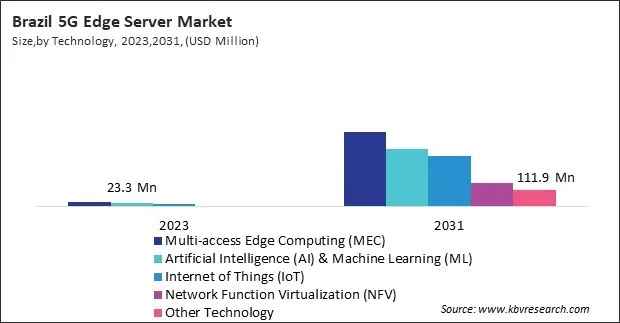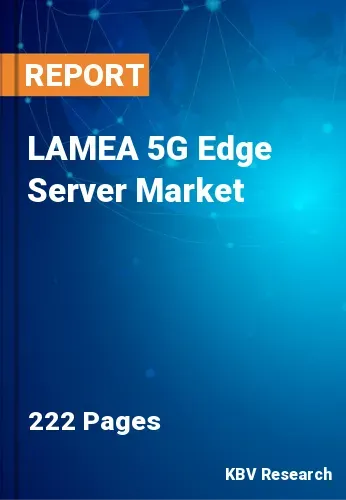The Latin America, Middle East and Africa 5G Edge Server Market would witness market growth of 44.9% CAGR during the forecast period (2024-2031).
The Brazil market dominated the LAMEA 5G Edge Server Market by Country in 2023, and would continue to be a dominant market till 2031; thereby, achieving a market value of $1,512.1 million by 2031. The Argentina market is expected to witness a CAGR of 45.9% during (2024 - 2031). Additionally, The UAE market would register a CAGR of 43.7% during (2024 - 2031).

5G edge servers address this challenge by reducing the physical distance between game servers and players, thus minimizing latency. By processing game data at the edge—closer to where the players are—these servers significantly reduce the round-trip time for data transmission. This ensures that players experience smooth, real-time interactions with minimal lag. The ability of edge servers to offer this low-latency experience makes them an essential part of the infrastructure supporting the rapid growth of cloud gaming.
Edge computing also significantly enhances network security and data privacy, key concerns in today's connected world. By processing data locally, 5G edge servers reduce the need to transmit sensitive information over long distances, minimizing the risk of data breaches and cyberattacks. This is of the utmost significance in industries such as healthcare and banking, where the protection of sensitive information is necessary. Financial institutions use 5G edge servers to support real-time data analytics for fraud detection and risk assessment functions. Banks can reduce latency and improve customer experience by processing transactions locally while ensuring that sensitive financial data remains secure. In healthcare, edge computing helps protect patient records by keeping data processing close to the source, reducing the risk of unauthorized access.
Brazil is also seeing rapid expansion in e-commerce, driving demand for fulfillment centers capable of handling larger order volumes. The necessity for sophisticated logistics technologies, particularly for last-mile delivery, has expanded as a result of Brazil's extensive and diverse geography, as well as urban challenges. Technologies like route optimization, real-time tracking, and delivery scheduling systems have become essential for meeting the growing expectations of Brazilian consumers. According to ITA, Brazil's e-commerce sector is expected to exceed US$200 billion by 2026, with an annual growth rate of 14.3%. As consumers in Brazil demand more flexible delivery options, logistics providers need to utilize advanced technologies like 5G edge servers to optimize delivery routes and improve speed. Therefore, the aforementioned factors create lucrative growth opportunities for the region's market.
Free Valuable Insights: The Worldwide 5G Edge Server Market is Projected to reach USD 76.4 Billion by 2031, at a CAGR of 41.7%
Based on Enterprise Size, the market is segmented into Large Enterprises, and Small & Medium Enterprises (SMEs). Based on Component, the market is segmented into Hardware (Servers, Storage Devices, and Networking Equipment), Software (Network Management Software, Edge Orchestration, and Security Solutions), and Services (Deployment & Integration Services, Consulting Services, and Support & Maintenance Services). Based on Deployment Type, the market is segmented into On-Premises, Cloud-based, and Hybrid. Based on Technology, the market is segmented into Multi-access Edge Computing (MEC), Artificial Intelligence (AI) & Machine Learning (ML), Internet of Things (IoT), Network Function Virtualization (NFV), and Other Technology. Based on Application, the market is segmented into Content Delivery, Industrial IoT, Autonomous Vehicles, Augmented Reality (AR) & Virtual Reality (VR), and Other Application. Based on End-Use Industry, the market is segmented into Telecommunications, Automotive & Transportation, Industrial Automation, Healthcare, Retail & E-commerce, Energy & Utilities, and Other End-Use Industry. Based on countries, the market is segmented into Brazil, Argentina, UAE, Saudi Arabia, South Africa, Nigeria, and Rest of LAMEA.

By Enterprise Size
By Component
By Deployment Type
By Technology
By Application
By End-Use Industry
By Country
Our team of dedicated experts can provide you with attractive expansion opportunities for your business.

